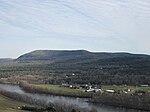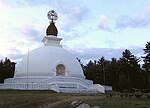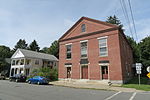New England Peace Pagoda
1985 establishments in MassachusettsBuddhist temples in MassachusettsJapanese-American culture in MassachusettsPagodas in the United States

The New England Peace Pagoda is a peace pagoda located in Leverett, Massachusetts. It was the first Nipponzan-Myōhōji peace pagoda to be built in the United States.
Excerpt from the Wikipedia article New England Peace Pagoda (License: CC BY-SA 3.0, Authors, Images).New England Peace Pagoda
Hemenway Road,
Geographical coordinates (GPS) Address External links Nearby Places Show on map
Geographical coordinates (GPS)
| Latitude | Longitude |
|---|---|
| N 42.498994 ° | E -72.491108 ° |
Address
Leverett Peace Pagoda
Hemenway Road
01351
Massachusetts, United States
Open on Google Maps









